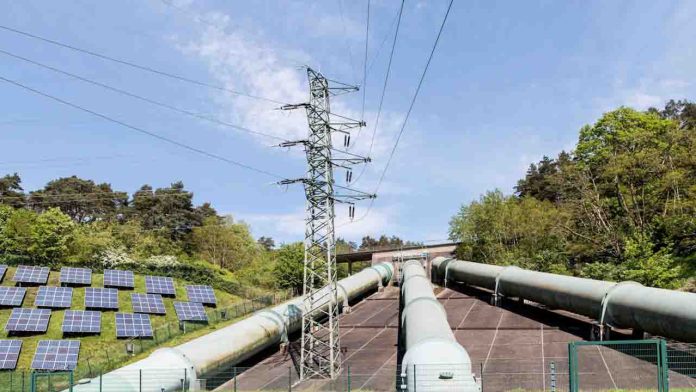Pakistan (Commonwealth) _ Pakistan and Turkmenistan have reached an agreement to expedite Turkmenistan-Afghanistan-Pakistan-India Natural Gas Pipeline (TAPI) project that would enable the Central Asian state to send natural gas to Pakistan and India through Afghanistan, boosting regional economic activity and benefiting all involved nations.
The agreement was achieved during a meeting between Federal Minister for Petroleum Dr. Musadik Malik and Turkmen Foreign Minister Rasit Meredow, who came in Islamabad for a two-day visit. The CEO of TAPI Pipeline Company Limited also attended the meeting.
The Turkmenistan-Afghanistan-Pakistan-India (TAPI) pipeline will begin in Galkynysh, the world’s second-largest gas field, and conclude in the Indian city of Fazilka near the Pakistan border. If the project is finished, Turkmenistan will be able to deliver around 33 billion m3 of natural gas annually along a route stretching over 1800 kilometers.
Pakistan and Turkmenistan are trying to “expedite” the pipeline project, according to an official statement made by the Ministry of Energy’s Petroleum Division.
The TAPI pipeline project would reduce energy costs, boosting industrial expansion, creating employment, and fostering economic development,” Pakistan’s Petroleum Minister stated at the meeting. “Reliable and affordable energy supplies are critical for the industrial sector and overall economic stability.”
“This project, which aims to promote economic integration and energy security, has made significant progress through collaborative efforts,” he added, emphasizing the necessity of continuing interaction between the two nations.
Malik underlined that Pakistan was completely devoted to the project, which was critical for regional cooperation in energy and infrastructural development. The visiting dignitary thanked the Pakistani authorities for their cordial welcome to his group. “Together we will chalk out a roadmap for collaboration between both countries,” he announced.
Other meeting attendees emphasized the project’s strategic relevance in improving regional connections, encouraging economic growth, and addressing the energy needs of member nations.
The TAPI project was proposed in the early 1990s and officially approved in December 2010. It has mostly been delayed because to security concerns, geopolitical difficulties, finance issues, and bureaucratic roadblocks.
The Turkmenistan-Afghanistan-Pakistan-India Natural Gas Pipeline (TAPI) Project intends to export up to 33 billion cubic meters (bcm) of natural gas per year via a projected 1,800-kilometer pipeline from Turkmenistan to Afghanistan, Pakistan, and India.
The TAPI Gas Pipeline, also known as the Trans-Afghanistan Pipeline, is being constructed by the Galkynysh – TAPI Pipeline Company Limited, with participation from the Asian Development Bank.The pipeline will deliver natural gas from the Galkynysh Gas Field in Turkmenistan via Afghanistan to Pakistan and eventually India. Construction on the project began in Turkmenistan on December 13, 2015, with the Afghanistan-Pakistan segment of the pipeline beginning in February 2018.Proponents of the idea consider it a contemporary extension of the Silk Road.
As of 2023, pipeline development is still halted. This initiative began with foreign oil firms’ engagement in Kazakhstan and Turkmenistan in the early 1990s. Due to Russia’s refusal to utilize its export pipeline network, these corporations required an independent route to sidestep both Iran and Russia.
The pipeline will be 1,420 mm (56 in) in diameter and have an operating pressure of 100 atm (10,000 kPa).The annual capacity is 33×109 m3 (1.2×1012 cu ft) of natural gas, with 5×109 m3 (180×109 cu ft) allocated to Afghanistan and 14×109 m3 (490×109 cu ft) to Pakistan and India.
Six compressor stations would be built beside the pipeline. The pipeline project was initially anticipated to cost US$7.6 billion, but has now been updated to $10 billion.Türkmengaz is the project’s major partner.
The 1,814 km (1,127 mi) pipeline will connect the world’s second biggest gas resource, Galkynysh, in Turkmenistan, through Afghanistan and Pakistan to India.The TAPI pipeline will be built along the Kandahar-Herat Highway in western Afghanistan before passing via Quetta and Multan, Pakistan. The pipeline would end at Fazilka, an Indian town on the Pakistan-India border. ADB has contributed significantly to the TAPI pipeline’s progress to date. In the latter capacity, ADB assisted in the establishment of TPCL, the selection of Turkmengaz as consortium leader, and the completion of the Shareholders and Investment Agreements.
ADB with the intention of decreasing poverty in Asia and the Pacific by promoting inclusive economic growth, ecologically sustainable growth, and regional integration assist the project which will deliver up to 33 billion cubic meters of natural gas per year to the other three nations over the next 30 years.







